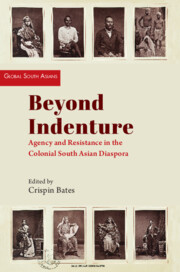Book contents
- Frontmatter
- Dedication
- Contents
- List of Figures and Tables
- Acknowledgements
- Introduction
- I Agency and Resistance
- 1 Negotiating Power in Colonial Natal: Indentured Migrants in Natal, 1860–1911
- 2 Stewed Plums, Baked Porridge and Flavoured Tea: Poisoning by Indian Domestic Servants in Colonial Natal
- 3 Labour Resistance in Indenture Plantations in the Assam Valley
- 4 A Forgotten Narrative of the Satyagraha Campaign: The Treatment of Prisoners between 1907 and 1914
- 5 Toilers across the Seas: Racial Discrimination and Political Assertion among Sikhs in Canada
- II Remigration
- 6 The Remigration of Hindostanis from Surinam to India, 1878–1921
- 7 Not So Anchored: The Remigration of Indians within the Caribbean Region
- 8 On the Move: Remigration in the Indian Ocean, 1850–1906
- III Gender and Family
- 9 Intimate Lives on Rubber Plantations: The Textures of Indian Coolie Relations in British Malaya
- 10 Labouring under the Law: Exploring the Agency of Indian Women under Indenture in Colonial Natal, 1860–1911
- 11 Gujarati ‘Passenger Indians’ in the Eastern Cape since 1900: Business, Mobility, Caste and Community
- 12 The Eurasian Female Workforce and Imperial Britain: Harnessing Domestic Labour by People of Mixed Racial Descent
- IV Legacies
- 13 After the Long March: Colonial-Era ‘Relief’ for Burma Indian Evacuees in Visakhapatnam District, 1942–1948
- 14 Opposing the Group Areas Act and Resisting Forced Displacement in Durban, South Africa
- 15 Indo-Fijians: From Agency to Abjection
- 16 New and Old Diasporas of South South Asia: Sri Lanka and Cyber-Nationalism in Malaysia
- About the Contributors
- Index
14 - Opposing the Group Areas Act and Resisting Forced Displacement in Durban, South Africa
Published online by Cambridge University Press: 31 December 2023
- Frontmatter
- Dedication
- Contents
- List of Figures and Tables
- Acknowledgements
- Introduction
- I Agency and Resistance
- 1 Negotiating Power in Colonial Natal: Indentured Migrants in Natal, 1860–1911
- 2 Stewed Plums, Baked Porridge and Flavoured Tea: Poisoning by Indian Domestic Servants in Colonial Natal
- 3 Labour Resistance in Indenture Plantations in the Assam Valley
- 4 A Forgotten Narrative of the Satyagraha Campaign: The Treatment of Prisoners between 1907 and 1914
- 5 Toilers across the Seas: Racial Discrimination and Political Assertion among Sikhs in Canada
- II Remigration
- 6 The Remigration of Hindostanis from Surinam to India, 1878–1921
- 7 Not So Anchored: The Remigration of Indians within the Caribbean Region
- 8 On the Move: Remigration in the Indian Ocean, 1850–1906
- III Gender and Family
- 9 Intimate Lives on Rubber Plantations: The Textures of Indian Coolie Relations in British Malaya
- 10 Labouring under the Law: Exploring the Agency of Indian Women under Indenture in Colonial Natal, 1860–1911
- 11 Gujarati ‘Passenger Indians’ in the Eastern Cape since 1900: Business, Mobility, Caste and Community
- 12 The Eurasian Female Workforce and Imperial Britain: Harnessing Domestic Labour by People of Mixed Racial Descent
- IV Legacies
- 13 After the Long March: Colonial-Era ‘Relief’ for Burma Indian Evacuees in Visakhapatnam District, 1942–1948
- 14 Opposing the Group Areas Act and Resisting Forced Displacement in Durban, South Africa
- 15 Indo-Fijians: From Agency to Abjection
- 16 New and Old Diasporas of South South Asia: Sri Lanka and Cyber-Nationalism in Malaysia
- About the Contributors
- Index
Summary
The implementation of apartheid in South Africa centred to a large extent on the control of residential location. One of the cornerstones of apartheid and one of the few areas in which the policy has been effective was in the provision of separate residential areas for the different race groups. This spatial segregation and segmentation of residential areas for whites, Coloureds, Indians and Africans expressed the impact of apartheid most acutely. The Group Areas Act (GAA), 1950, was one of the key instruments used to reinforce the ideology of apartheid and emphasised separate residential areas, educational services and other amenities for the different race groups.
The major impact of group area dislocations has been borne by black communities, particularly Coloureds and Indians. According to Johannes T. Schoombee, ‘the actual legislative model taken for group areas has been the string of legislative measures starting in the 1880s directed against “Asiatics” [particularly Indians] in the Transvaal and later, Natal’.
Indians represent the smallest proportion of the four population groups in South Africa, numbering about one million. Yet, proportionately, the impact of the GAA ‘has been borne most heavily by the Indians, with one in four of them having been resettled’. Indians ‘suffered the most from the implementation of the GAA, either through removals or the inadequate provision of living space’. This was especially so in the port city of Durban, situated on the east coast of South Africa, where indentured labourers from India first disembarked in 1860 and who were followed by traders (or passengers who paid their own way) in the mid-1870s.
This chapter is a continuation of my earlier historical research on the GAA in Durban. The focus of the chapter is on opposition to the GAA and resistance to forced displacement. The reasons for the failure of resistance is also analysed. The chapter is divided into three sections. The background and context are presented in the first section. Opposing the GAA is the theme of the second section. Resisting forced displacement is discussed in the third section, and the sub-themes include the approaches of the Natal Indian Congress (NIC), the Natal Indian Organisation (NIO), the ‘All-in-Congress’, and the 1958 proclamations and mass action.
The data for this chapter were derived from a variety of primary documentary sources, ranging from official central and local government records and newspaper reports to memoranda prepared by political and civil society organisations.
- Type
- Chapter
- Information
- Beyond IndentureAgency and Resistance in the Colonial South Asian Diaspora, pp. 315 - 340Publisher: Cambridge University PressPrint publication year: 2024



